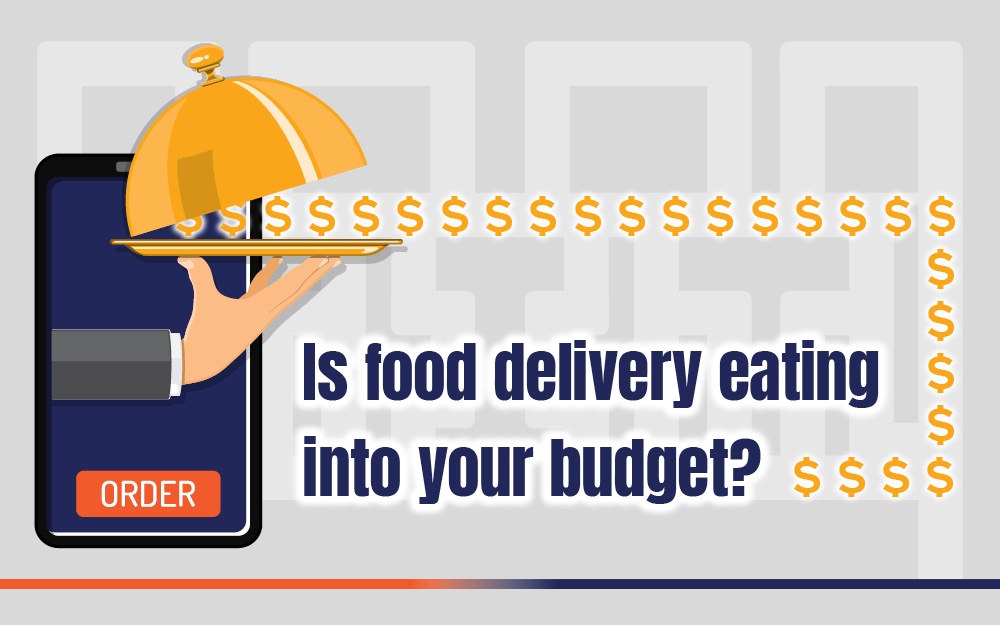Is food delivery eating into your budget?

The Australian food delivery industry is booming, with the ABS reporting an 18% increase in take-away spending over just three years, and delivery apps such as Uber Eats and Deliveroo turning over sales of around $2.6 billion annually.i
App culture has played a big part in this. Ordering food is simpler than ever before, and the quality and variety of what’s on offer continues to rise. It’s not just pizzas and fried rice anymore; these days you can practically order any cuisine imaginable if you live in a major city. But, while having these options at our fingertips is both exciting and convenient, it comes at a cost.
The cost of ordering in
We all know that ordering in costs more than cooking from scratch but the numbers may still surprise you. Once you’ve added delivery fees, on average it is five times more expensive to order food from a restaurant than it is to cook at home.ii And if you’re amongst the many Australians who are now doing it multiple times a week, those costs really start to add up.
It’s easy to understand the appeal. We’ve all been in that position where after a long day of work the last thing you feel like doing is cooking. Or worse, having to leave the house again to do a last-minute supermarket run.
Our busy lives often mean we choose convenience over what’s best for our wallet. And like any budgeting measure, reducing how much you order in is going to take some planning. While this may sound challenging, the benefits are worth it.
Thinking ahead
We all have different reasons for ordering in, but one way to reduce its impact on your budget is to try to see it as a special treat rather than part of your daily routine. Getting into some good habits now regarding food planning could save you a bucket in the long run.
Here are some tips to get you started
- Prepare a plan so that all your decisions regarding food for the week are made in advance—Sunday is ideal!—and not night by night.
- Master some simple recipes you love.
- Start shopping seasonally and at markets for some great bargains.
- Make cooking a shared task. It’s more fun with family or friends.
- Cook in bulk, and refrigerate or freeze your leftovers.
Track your spending
The first step to any budget is creating a clear picture of your current expenses. It might then be worth taking the time to review how much food is costing you and your family on a weekly basis. This includes all the times you’ve ordered in, all the cafés you’ve dropped into for a coffee and a cake, even the servos you’ve picked up some snacks from on the way home. There are many apps available to help make this task easy. As you get better at planning and cooking at home, continue to review your food spending, updating as necessary to reach your savings goals.
Waste and our waist-lines
There are also ethical considerations when it comes to ordering in. The environmental impact of all that packaging cannot be denied – a single burger is often wrapped, bagged and then rebagged, just to keep the heat in before being driven to your door.
Some also fear that the expansion of food delivery might be contributing to the obesity epidemic. Certainly, this cult of ordering in is but another symptom of our sedentary lives. And it’s not always simple to find out what ingredients have been used in the food you order. Shopping and cooking for yourself is healthier on two fronts: you control the quality of the produce and get a little exercise as a bonus.
We all need treats from time to time. And we are blessed in our booming multicultural cities to have such an array of culinary excellence just a click away. But watch those clicks as the growing trend towards ordering in is increasingly eating into our budgets.
i https://www.finder.com.au/australians-spend-1590-each-year-on-delivered-food
ii https://www.forbes.com/sites/priceonomics/2018/07/10/heres-how-much-money-do-you-save-by-cooking-at-home/#565669b335e5
As always, if you would like to discuss the contents of this newsletter please give us a call 07 5559 5760.
 Hugh Robertson
Hugh Robertson